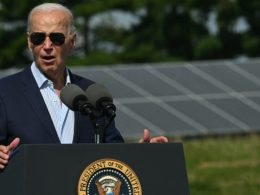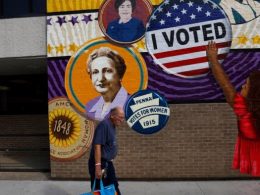Brian Smith, who has owned the Tombstone Tactical gun store in Phoenix for the past decade, was elated by Donald Trump’s resounding election victory — even though he thinks it could be bad for his business.
Gun owners have stocked up on firearms in recent years when Democrats held the White House, fearing limits or bans on gun sales. But without the fear of gun restrictions, the industry faced a “Trump Slump” when the Republican took office in 2017, with many dealers going out of business. He thinks the same will happen this time.
“It’s not the best thing for gun sales but it’s the best thing for the country,” Smith said of Trump’s victory. “We’re happy about it.”
The excitement from Republicans such as Smith contrasts with the Democrats’ expressions of anger and hopelessness across a deeply split country.
Some said they felt let down by their party and called for an overhaul of its message for the American people. Others expressed a sense of fear as they reflected on Trump’s agenda.
“I’m concerned about losing more rights,” said Deborah Kladney, citing Trump’s appointment of the Supreme Court justices who helped overturn Roe vs Wade’s abortion protections. “He could change everything.”
Kladney, a 75-year-old former professional dancer and teacher in Reno, Nevada, said she was “despondent” that the electorate would pick Trump despite knowing so much about his behaviour.
“He hasn’t put forth anything that he’s not,” she said. “He hasn’t tried to fool us: he’s a racist, a misogynist, a liar, a cheat. He’s an all-round bad man and he’s not tried to hide any of that — and yet the population still picked him. That blows me away.”
The split-screen of ecstasy and desolation in Arizona and Nevada — the final two states yet to call the race — epitomises the divisions that have blown open during the most rancorous election in living memory.
Connor Gentry, a student at Arizona State University who had volunteered for Harris, said he was now “worried for our country” — and said his party needed to reinvent itself to win back voters who had defected to Trump.
“As a Democratic party we need to regroup. We need a new platform to really retain voters because it looks like we lost Latino men and people of colour. People really wanted change. We need to run on policy and not feelings.”
Yet Republicans were feeling charged up about Trump’s win — and his chance to enact his radical policies quickly. Republican control of the Senate and the possibility the party will retain a majority in the House of Representatives could leave Trump with huge legislative power.
Bruce Parks, chair of the Washoe county Republicans in Nevada, said he looked forward to a swift rollout of the Trump agenda — building up oil production, shutting the border, and deporting undocumented workers.
But his main hope, he said, was for Trump to overhaul politics in the capital — by getting rid of “all those swamp creatures floating around DC”, he said.
“I hope that he fulfils that commitment this time,” Parks said.
Some Black people, however, expressed concern that years of progress could be at risk because of Trump’s election.
“To have a hate-spewing, convicted felon still be considered a more viable candidate to run this country is very unfortunate,” said Daniel Dickey, founder of The Resource Guild, a marketing consultancy group in Atlanta.
“We’re just going to continue the fight that we’ve always had as a people.”
He laid some blame on the Democratic party, which he said had forgotten how to connect with “average, everyday, low- to moderate-income Americans”.
“Those are black and white, they’re in rural areas, they’re in major cities,” he said. “But I don’t think the Democratic party is connecting to the less fortunate among us.”
Trump swayed many of those voters, while picking off segments of traditional Democrats such as Latinos and Black men. He also made inroads with younger white men, often considered unreliable voters.
Among them was Carson Carpenter, who served as the president of the College Republicans at Arizona State University. “We’re feeling very good today,” he said. “Everyone was surprised by the margin.”
He noted younger conservative men had voted in record numbers and pointed to influential podcasters such as comedian Theo Von for playing a key role in engaging them in politics.
“They moved politics into pop culture,” he said.
Harris had “overplayed” her pitch on abortion rights to younger voters — a message that did not land with some men his age, he said.
“A lot of conservative men looked at it and said the right to an abortion has been turned back to the states,” he said. “We’re voting for a candidate here — we’re not voting for one issue on the ballot.”
For many, the main issue was the sharp rise in the cost of living over the past four years. Harris struggled to shake perceptions that the Joe Biden administration had mishandled the economy, with polls suggesting a majority of voters trusted Trump more to improve their finances.
Patti Raanes, who cheered Trump’s victory on the streets of downtown Reno, said the former president would bring down prices.
The 71-year-old retiree backed Trump for a second term because he would put “more money in my pocket — and hopefully the groceries will go down again”.
But Martin Landaburu, another 55-year-old Reno resident, was angry at his fellow citizens. “America deserves Donald Trump,” he said, adding he was worried about him implementing the rightwing Project 2025 programme. “If he makes this shit come true — I don’t know, I really don’t.”
Gentry, the ASU student who had volunteered for Harris, said he remained committed to working in politics. “I plan to stay involved and stop Trumpism at its core.”
Source link









